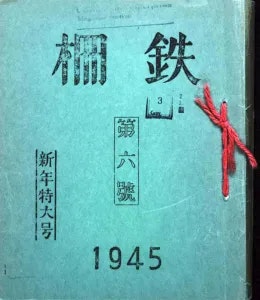Tessaku Stories
Tessaku Stories: Japanese American literature in Japanese, written inside U.S. concentration camps
What is Tessaku?

Tessaku [Iron Fence] is a nine-volume Japanese literary journal written by dissident Japanese Americans incarcerated in Tule Lake Segregation Center.
Published and distributed to thousands of Japanese Americans living in the 10 American concentration camps, Tessaku "provided a protected space where interned writers could express complex and contradictory sentiments regarding loyalty and military service."
Who were the Tessaku writers?
Most of the Tessaku writers were kibei, Japanese Americans born in the U.S. but educated in Japan. Members of a literary movement that emerged in the 1930s, they wrote poems, short stories, and essays about their experiences before and during incarceration. These were writers who had been segregated to Tule Lake from other camps, because they had refused to swear unconditional loyalty to the United States while incarcerated.
Tessaku has remained largely unknown and untranslated for nearly 80 years.
We are currently living a life robbed of our freedom in a concentration camp. Yet this situation is in fact a trial through which we can express our culture. In this way (publishing literature) we can survive this trial without losing ourselves.
What is Tessaku Stories?
Tessaku Stories is a multimedia project dedicated to:
- translating the works in the Tessaku journal
- bringing the Tessaku works to the Japanese American community for input and healing
- interpreting Tessaku for a wider audience.
What we've done to date:
- Translated more than 20 works from Tessaku
- Researched background of writers
- Produced Chusei, a short film on the dilemma faced by kibei over loyalty to the U.S.
For release in 2023-2026:
- Tessaku website: A website making the full works available to the public in Japanese and English for new frontiers of understanding of the transnational Japanese American incarceration experience, and further study.
- Short Film Adaptation: My Father Was Also Taken -- Based on a story by Fujio Tanizaki, My Father Was Also Taken follows Kenji, a junior high school student, as he discovers his father has been abducted and his family makes a journey to visit him in a detention camp.
- Short Film Adaptation: Jidai (The Age) Kazumi -- young man incarcerated in Poston, Arizona must decide whether to separate from his mother after he refuses to sign a loyalty oath to the United States.

